Hello and welcome to Episode 40 of Read Paradise Lost with me, Jane Davis, a podcast and Substack newsletter about my project to read all of Paradise Lost by John Milton, aloud, and with a sometimes word-by-word, sometimes line-by-line discussion. This is a one-take recording with no editing, so forgive noise of seagulls, my coughing, or sound of men drilling next door. Rough and ready reading is what you get. See Episode 1 for an introduction to the project.
A goodly 100+ lines this week, read at some speed, to comfort any readers who may have been feeling trapped, for the past few weeks, in the heavy treacle of not understanding, or caring much about, Milton’s theology
I’ve read the poem many times and have managed, without any sense of loss, to ignore the more difficult theological parts. Now, for the first time, in this Very Slow Reading, I find myself wanting to understand all that more than before. But I don’t think other readers (especially first time readers) of the poem have to be bogged down in it. I’m aware that it may be unbearable for some, and I want you to stay with me, so stepping lightly over parts that may suck us under, I’m proposing, this week, to speed up a bit.
If you have been feeling stuck, I want to offer the advice I’ve always read by.
Skip.
When you can’t understand or are bored, skip.
Our job as alert readers, especially first time round, is not to understand every word, but to find the parts we are most interested in, moved by. That will keep us going, and, in an epic like this, keeping going is the great achievement.
Well done on being at episode 40!
This week, we begin with the Father explaining what will happen as a result of the Son’s offer to redeem humanity by becoming a man…(this first section of todays chunk is lines 303 to 341. )
Nor shalt thou by descending to assume
Mans Nature, less'n or degrade thine owne.
Because thou hast, though Thron'd in highest bliss [ 305 ]
Equal to God, and equally enjoying
God-like fruition, quitted all to save
A World from utter loss, and hast been found
By Merit more then Birthright Son of God,
Found worthiest to be so by being Good, [ 310 ]
Farr more then Great or High; because in thee
Love hath abounded more then Glory abounds,
Therefore thy Humiliation shall exalt
With thee thy Manhood also to this Throne;
Here shalt thou sit incarnate, here shalt Reign [ 315 ]
Both God and Man, Son both of God and Man,
Anointed universal King, all Power
I give thee, reign for ever, and assume
Thy Merits; under thee as Head Supream
Thrones, Princedoms, Powers, Dominions I reduce: [ 320 ]
All knees to thee shall bow, of them that bide
In Heaven, or Earth, or under Earth in Hell;
When thou attended gloriously from Heav'n
Shalt in the Sky appeer, and from thee send
The summoning Arch-Angels to proclaime [ 325 ]
Thy dread Tribunal: forthwith from all Windes
The living, and forthwith the cited dead
Of all past Ages to the general Doom
Shall hast'n, such a peal shall rouse thir sleep.
Then all thy Saints assembl'd, thou shalt judge [ 330 ]
Bad men and Angels, they arraignd shall sink
Beneath thy Sentence; Hell her numbers full,
Thenceforth shall be for ever shut. Mean while
The World shall burn, and from her ashes spring
New Heav'n and Earth, wherein the just shall dwell [ 335 ]
And after all thir tribulations long
See golden days, fruitful of golden deeds,
With Joy and Love triumphing, and fair Truth.
Then thou thy regal Scepter shalt lay by,
For regal Scepter then no more shall need, [ 340 ]
God shall be All in All.
The first thing I was moved by here was line 311 ; ‘because in thee/Love hath abounded more then Glory abounds,’ which seemed like God reshaping the very nature of Godhead and putting love as most important. More important than glory.
This is an antidote to ‘Ingrate!’ (Book 3 lines 96-99)
I was even more amazed by what follows, the union of God and Man will become the centre of all, God the Father retiring, giving all power to this new God, Son+Man:
Here shalt thou sit incarnate, here shalt Reign [ 315 ]
Both God and Man, Son both of God and Man,
Anointed universal King, all Power
I give thee, reign for ever, and assume
Thy Merits; under thee as Head Supream
Thrones, Princedoms, Powers, Dominions I reduce: [ 320 ]
All knees to thee shall bow, of them that bide
In Heaven, or Earth, or under Earth in Hell;
I am impressed by God the Father’s creative power, here remaking his own function as all-powerful in the light of this new development of ‘love.’
Wow, feel as if that really is enough for one reading! But we are moving fast, and on we go.
This newly imagined God shall judge everything:
Then all thy Saints assembl'd, thou shalt judge [ 330 ]
Bad men and Angels, they arraignd shall sink
Beneath thy Sentence; Hell her numbers full,
Thenceforth shall be for ever shut.
Reading, I felt a great sense of relief when I heard those gates shut. But as in previous weeks, I’m aware that my imagination is being asked to stretch beyond it’s natural boundaries. What could life with no bad in it possibly be like? How can that come about?
Mean while
The World shall burn, and from her ashes spring
New Heav'n and Earth, wherein the just shall dwell [ 335 ]
And after all thir tribulations long
See golden days, fruitful of golden deeds,
With Joy and Love triumphing, and fair Truth.
Then thou thy regal Scepter shalt lay by,
For regal Scepter then no more shall need, [ 340 ]
God shall be All in All.
On the edge of understanding here, I’m reading something like - God, (made of Son +Man, + joy+love+truth) will need no scepter (symbol of kingly power) because all will be God, ‘God shall be All in All. ‘
Phew. Rest a moment. Breathe.
God the Father, having imagined this greatest of all possible creative acts, the transformation of all things into one, now addresses the Heavenly Angels;
But all ye Gods,
Adore him, who to compass all this dies,
Adore the Son, and honour him as mee.
No sooner had th' Almighty ceas't, but all
The multitude of Angels with a shout [ 345 ]
Loud as from numbers without number, sweet
As from blest voices, uttering joy, Heav'n rung
With Jubilee, and loud Hosanna's filld
Th' eternal Regions: lowly reverent
Towards either Throne they bow, and to the ground [ 350 ]
With solemn adoration down they cast
Thir Crowns inwove with Amarant and Gold,
Immortal Amarant, a Flour which once
In Paradise, fast by the Tree of Life
Began to bloom, but soon for mans offence [ 355 ]
To Heav'n remov'd where first it grew, there grows,
And flours aloft shading the Fount of Life,
And where the river of Bliss through midst of Heavn
Rowls o're Elisian Flours her Amber stream;
With these that never fade the Spirits elect [ 360 ]
Bind thir resplendent locks inwreath'd with beams,
Now in loose Garlands thick thrown off, the bright
Pavement that like a Sea of Jasper shon
Impurpl'd with Celestial Roses smil'd.
Then Crown'd again thir gold'n Harps they took, [ 365 ]
Harps ever tun'd, that glittering by thir side
Like Quivers hung, and with Præamble sweet
Of charming symphonie they introduce
Thir sacred Song, and waken raptures high;
No voice exempt, no voice but well could joine [ 370 ]
Melodious part, such concord is in Heav'n.
This section with its description of the Heavenly host with their crowns of Amaranth woven in their hair, their harps ever tuned, made me think of my old conception of Milton as a puritan (these Angels seem more like cavaliers). They begin to sing;
Thee Father first they sung Omnipotent,
Immutable, Immortal, Infinite,
Eternal King; thee Author of all being,
Fountain of Light, thy self invisible [ 375 ]
Amidst the glorious brightness where thou sit'st
Thron'd inaccessible, but when thou shad'st
The full blaze of thy beams, and through a cloud
Drawn round about thee like a radiant Shrine,
Dark with excessive bright thy skirts appeer, [ 380 ]
Yet dazle Heav'n, that brightest Seraphim
Approach not, but with both wings veil thir eyes,
God cannot be seen, not even as light, but rather as blinded into dark by excessive bright. This unseeable presence seems connected to the power I experienced early, as God reimagined everything into one.
Thee next they sang of all Creation first,
Begotten Son, Divine Similitude,
In whose conspicuous count'nance, without cloud [ 385 ]
Made visible, th' Almighty Father shines,
Whom else no Creature can behold; on thee
Impresst the effulgence of his Glorie abides,
Transfus'd on thee his ample Spirit rests.
Next we hear of Son, first created presence, and that we may see him ‘without cloud’. On his face the unbearable light of God shines, and we (or the angels) looking may see that light, ‘transfus’d’. Wonderful picture.
The Heavenly choir continues with our first account of the war in Heaven, which will become the centre of the poem; notice line 391 ‘by thee threw down’ - meaning Son led the battle against The Aspiring Dominations (Satan’s Army);
Hee Heav'n of Heavens and all the Powers therein [ 390 ]
By thee created, and by thee threw down
Th' Aspiring Dominations: thou that day
Thy Fathers dreadful Thunder didst not spare,
Nor stop thy flaming Chariot wheels, that shook
Heav'ns everlasting Frame, while o're the necks [ 395 ]
Thou drov'st of warring Angels disarraid.
Back from pursuit thy Powers with loud acclaime
Thee only extoll'd, Son of thy Fathers might,
To execute fierce vengeance on his foes,
Satan’s army was doomed to vengeance but. The second Fall, the Fall of Man, the Angels sing, will be different. (As I read, I’m noticing some of the repetitions here: doom/pity/not strictly…)
Not so on Man; him through their malice fall'n, [ 400 ]
Father of Mercie and Grace, thou didst not doome
So strictly, but much more to pitie encline:
No sooner did thy dear and onely Son
Perceive thee purpos'd not to doom frail Man
So strictly, but much more to pitie enclin'd, [ 405 ]
He to appease thy wrauth, and end the strife
Of Mercy and Justice in thy face discern'd,
Regardless of the Bliss wherein hee sat
Second to thee, offerd himself to die
For mans offence. O unexampl'd love, [ 410 ]
Love no where to be found less then Divine!
Hail Son of God, Saviour of Men, thy Name
Shall be the copious matter of my Song
Henceforth, and never shall my Harp thy praise
Forget, nor from thy Fathers praise disjoine. [ 415 ]
I’m most interested in this bit. The Son, picking up that repeated word, ‘pitie’ was moved to appease God’s wrath but more than that to ‘end the strife/Of Mercy and Justice in thy face discern'd’.
but much more to pitie enclin'd, [ 405 ]
He to appease thy wrauth, and end the strife
Of Mercy and Justice in thy face discern'd,
Regardless of the Bliss wherein hee sat
Second to thee, offerd himself to die
So the Son’s act of love rose first from pity and love for God the Father, who seems troubled, even damaged by the strife he witnesses, as his creatures fall from him, and that strife is played out in his face.
This seems to me a profoundly human moment at the centre of Milton’s vision of God. One man (I’ll call Son that, a shorthand) seeing terrible tension playing on the face of another, seeks to end the strife by becoming the sacrifice of love needed to end this terrible state of being.
This is a vision of what Milton sees as the deep structure of Christianity, and I’ve never before understood this in my readings of Paradise Lost.
Feel almost overcome by the newness, and hugeness, of it.
In the past I’ve found the ‘heaven’ parts of the poem heavy going and frankly boring. Though I still don’t understand large amounts of this, I feel this week, I’ve experienced something quite new.
Seeing the face of God express, so humanly, the conflicts generated by his conflicted creation has been a moving and powerful experience.
I’m thinking also of Milton as a great creator sympathetically imagining the experience of God. He had his own understanding of creation - both of revolution and of poetry - his sense of disgust at some of what happened during and after the revolution must be present in (for shorthand, ‘Ingrate!’). We did all that and what happened ? Fallen man asserted his sinning self.
There is also perhaps a sense of anxiety about the sprawling, unwieldy and sometimes dangerous nature of the poem he is making. His kindly response, via Son, to a messy Creator whose creation isn’t what he would have hoped, is one I’d like to emulate as his reader.
More next week


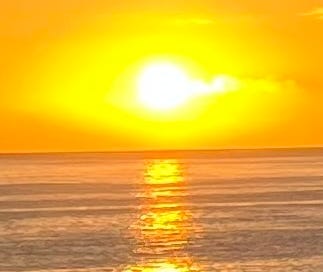




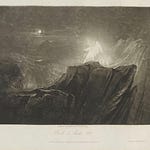
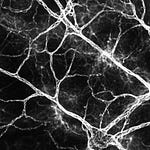

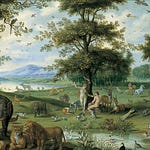
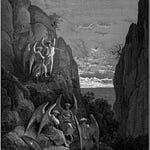
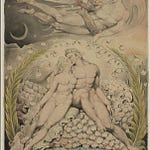
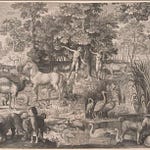
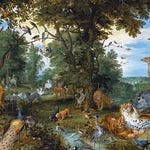
Share this post